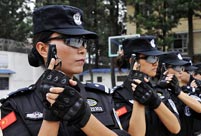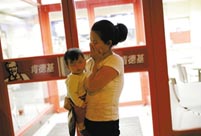 China's new-type guided missile frigate 'Bengbu' in live fire training
China's new-type guided missile frigate 'Bengbu' in live fire training
 China’s weekly story (2013.8.10 - 8.23)
China’s weekly story (2013.8.10 - 8.23)
 Flight team performs first show abroad
Flight team performs first show abroad
 With parents bedridden, 12-year-old boy becomes pillar of the family
With parents bedridden, 12-year-old boy becomes pillar of the family
 Top 10 private Chinese enterprises 2013
Top 10 private Chinese enterprises 2013
 The most gorgeous Chinese women in the eyes of foreigners
The most gorgeous Chinese women in the eyes of foreigners
September 3 is the 68th anniversary of China's victory in the War of Resistance against Japanese Aggression and the World Anti-fascist War. Although I am now far away from Thailand, the canyon that the Burma Railway, also known as the "Death Railway," crossed constantly comes to my mind. The railway was built by the Japanese and linked Thailand and what was then Burma during WWII. Horror, starvation, sickness and death stalked the construction process.
In the canyon along the rail route, I was amazed by a tall tree standing on the edge of the cliff. This tree of life embraces such tenacious vitality that it could break through the rails that have been laying there for almost 70 years.
Every visitor to the canyon will remember this tree. It is a call for life by the thousands of prisoners of war (POWs) persecuted by the Japanese.
Descendants of Australian POWs have built a memorial in the Thai military camp, Hellfire Pass Museum, to remind all visitors that the victory of WWII did not come easily.
Hellfire is an accurate description of the construction scene decades ago. When night fell, the dim light could be seen from the jungle. That was the construction field where people were working all through the night.
The POWs and slave laborers were forced to work more than 10 hours per day. Each rail was laid with blood and life. Each kilometer of rail cost the lives of more than 600 people, whether they be British, Australian, Chinese, Thai or Myanmese.
When I was stationed in Thailand, I went to this museum many times. I often met Japanese. What they left in the guest book was wishes for peace.
However, no one really knows how they view this railway. In the eyes of some nationalist Japanese, the railway, built with lives of thousands of hundreds of POWs, represents victory rather than guilt.
According to an exhibition in the museum, after WWII, some Japanese took some tracks and rails back to Japan and collected them as souvenirs. They would hold commemorative activities, and some viewed them as tremendous achievements.
According to Wikipedia, Japanese veteran groups returned the first locomotive that ran on the railway to Japan. The locomotive now sits in the Yasukuni Shrine as a display of Japan's industrial achievements.
The knowledge of war of some Japanese seems to be limited. Such a mentality is not only the reason that Japan fell for militarism, but also why some Japanese still dream of imperialism.
In recent years, I have seen some memorial cemeteries built by Japanese in Southeast Asian countries. There is nothing wrong with Japanese hoping for peace. But whenever I went by those tombstones, I always felt that there was a lack of introduction to WWII and the atrocities committed by Japanese invaders.
French historian Annette Wieviorka explained that she wrote the book Auschwitz Explained to My Child because children should know what happened in WWII.
But children still have a lot of questions, like "Why would Nazis exterminate Jews?"
The same questions should also be raised to Japanese: Why were their ancestors so ruthless in war? Why could they view guilt as pride?
If these questions cannot be answered and if children do not have a clear understanding of these questions, more Japanese are bound to view the "Death Railway" as a victory for their country.
The author is a senior editor with People's Daily. He is now stationed in Brazil. [email protected]
 Mexican president delivers first State of Nation address
Mexican president delivers first State of Nation address Highlights of MAKS 2013 Int'l Aviation and Space Show
Highlights of MAKS 2013 Int'l Aviation and Space Show  10th China-ASEAN Expo opens in Nanning
10th China-ASEAN Expo opens in Nanning Baby born to save his sister - the story of a savior sibling
Baby born to save his sister - the story of a savior sibling Lady of mystery: Female SWAT team in prison disclosed
Lady of mystery: Female SWAT team in prison disclosed  Single mother, baby live in KFC restaurant for months
Single mother, baby live in KFC restaurant for months Top 10 naked hotels in the world
Top 10 naked hotels in the world The most gorgeous Chinese women in the eyes of foreigners
The most gorgeous Chinese women in the eyes of foreigners A collection of bizarre rooftop buildings around China
A collection of bizarre rooftop buildings around China Putin intimate contacts with marine animals
Putin intimate contacts with marine animals China's frigate 'Bengbu'in fire training
China's frigate 'Bengbu'in fire training Fresh students 'forced' to register in university independently
Fresh students 'forced' to register in university independently 2013 Taiwan Int'l Tourism Expo kicks off in Taipei
2013 Taiwan Int'l Tourism Expo kicks off in Taipei Photo story: Take a gap year
Photo story: Take a gap year Nokia's Global Headquarters: visiting a declining empire
Nokia's Global Headquarters: visiting a declining empireDay|Week|Month